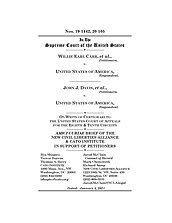Learn more about Cato’s Amicus Briefs Program.
Willie Carr and John Davis are both social security claimants whose applications for disability payments were denied by administrative law judges (ALJs) of the Social Security Administration (SSA). Those ALJs, like all social security ALJs at the time, were hired by agency staff members with no involvement from the social security commissioner. A short while after Carr and Davis had their claims denied, the Supreme Court decided Lucia v. SEC (2018), holding that ALJs of the Securities and Exchange Commission are “officers of the United States” and must be appointed in the manner that the Constitution’s Appointments Clause requires—by the president, the head of their department, or a court.
In light of Lucia, there’s no dispute that Social Security ALJs are also “officers of the United States” and that their hiring by agency staff violated the Constitution. The SSA admitted as much when the commissioner attempted to rehire all the ALJs herself. The ALJs who decided Davis and Carr’s claims were thus appointed improperly, and the remedy for that defect is normally a new hearing before a properly appointed ALJ.
But when Davis and Carr asked for a new hearing before a new ALJ, both of their requests were denied. The Eighth and Tenth Circuits, respectively, both held that they had waived any right to raise an Appointments Clause objection in federal court because they had not raised it during their hearings before the improperly appointed ALJs themselves. In administrative law parlance, the courts held that Davis and Carr were barred by the doctrine of “issue exhaustion,” a theory that an issue must be raised at every stage of an administrative process to receive judicial review.
Both Davis and Carr appealed to the Supreme Court, which granted and consolidated their cases. The Cato Institute has joined the New Civil Liberties Alliance to file an amicus brief supporting them. As explained in our brief, there is no federal statute or regulation preventing courts from considering issues not raised in a social security hearing. Creating a judge-made bar to such claims is particularly inappropriate here because the SSA specifically told its ALJs not to address any Appointments Clause arguments if they were raised. It thus wouldn’t have made any difference if Carr and Davis had raised the issue in their ALJ hearings.
Further, issue exhaustion rules are only appropriate for issues where, at a minimum, an administrative agency possesses the expertise and fact-finding ability to act in the role of a court of first review. That’s not the case here; non-adversarial social security hearings are not designed to review questions of constitutional law, and social security ALJs profess no expertise on the subject.
Davis and Carr raised their Appointments Clause issue as soon as they reached federal court, and that should have been enough for their claim to be addressed on the merits. The Supreme Court should reverse the Eighth and Tenth Circuits and hold that judge-made issue exhaustion is inappropriate for the type of structural constitutional claims that Carr and Davis have raised.

This work is licensed under a Creative Commons Attribution-NonCommercial-ShareAlike 4.0 International License.
